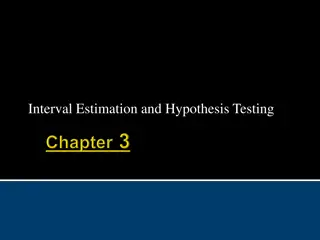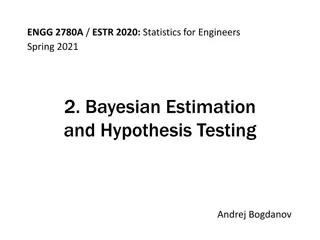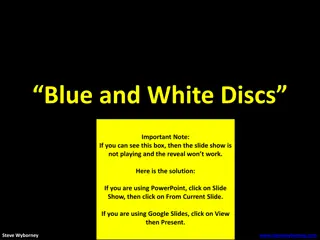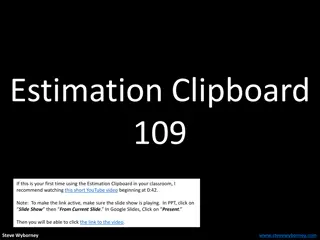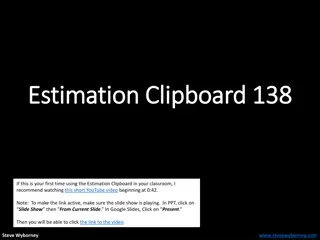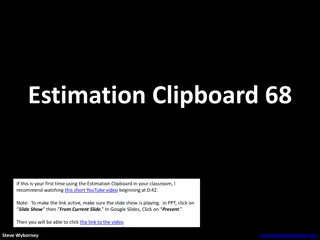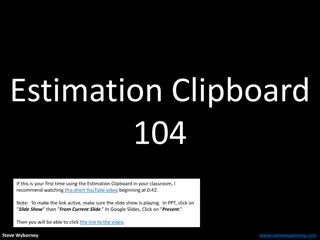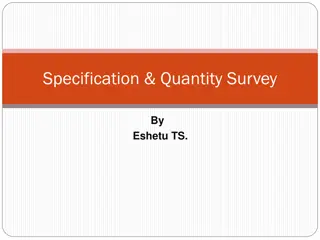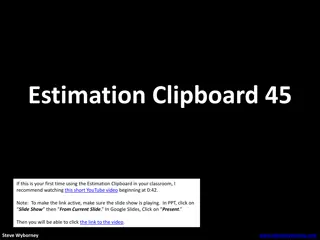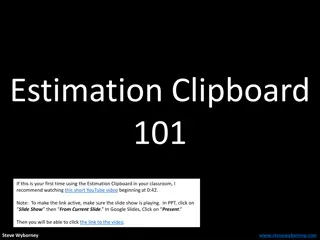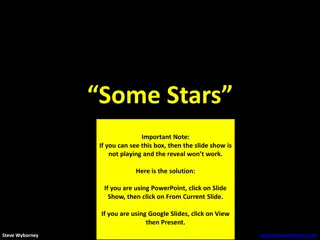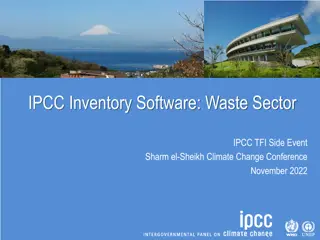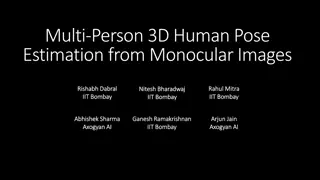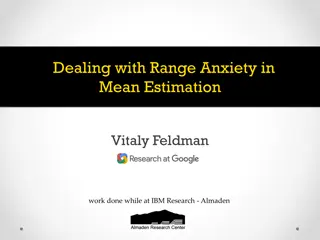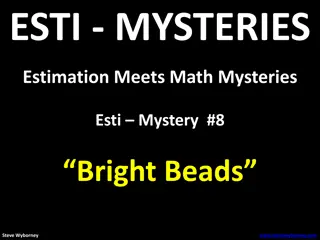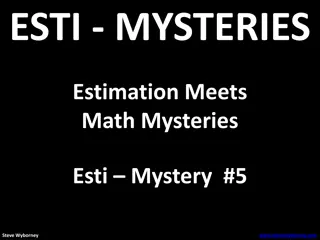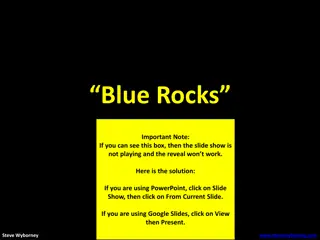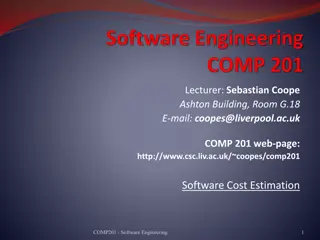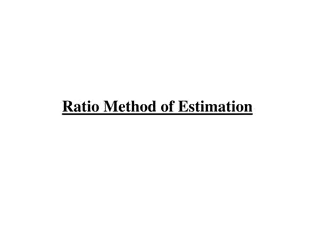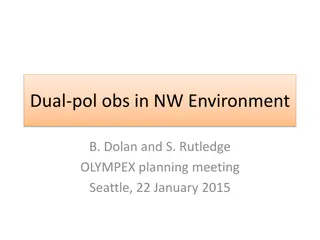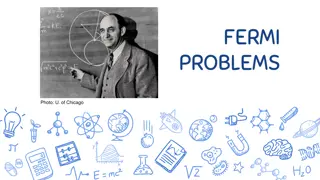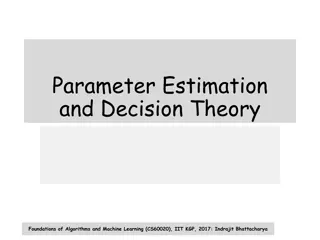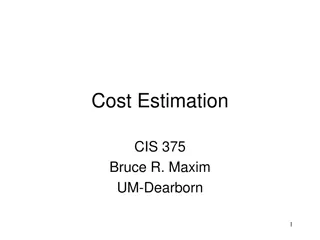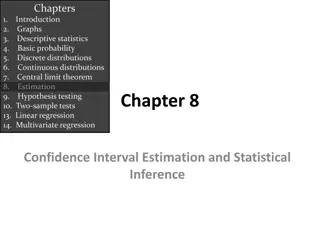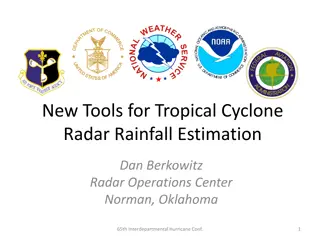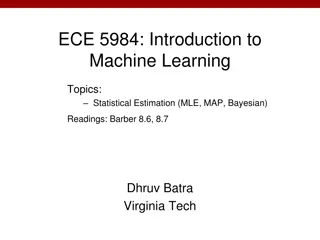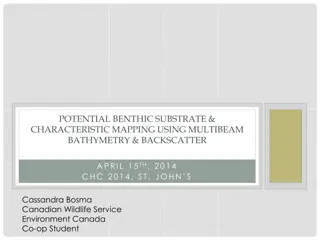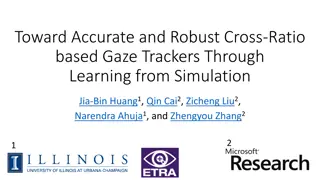Demand Estimation and Demand Forecasting
Demand estimation and forecasting are crucial processes for businesses to predict future demand for their products or services. Demand estimation involves analyzing the impact of various variables on demand levels and pricing strategies, while demand forecasting helps in planning production, new pro
1 views • 7 slides
Introduction to Econometric Theory for Games in Economic Analysis
This material delves into the fundamentals of econometric theory for games, focusing on estimation in static and dynamic games of incomplete information, as well as discrete static games of complete information, auction games, and algorithmic game theory. It covers basic tools, terminology, and main
8 views • 31 slides
Coastal Monitoring and Lessons Learned in Southwest England
Southwest England's coastal monitoring efforts, including the South West Coastal Monitoring program and lessons learned from the destruction of Hallsands in 1917 due to lack of understanding of coastal processes. The monitoring involves data collection on beach profiles, bathymetry, wave patterns, a
4 views • 15 slides
Fun Estimation Game: Fishing for Four Mystery
Dive into the fun and engaging estimation game "Fishing for Four" where you use clues to narrow down the number of fish in a vase and outside it. As you decipher the hints, refine your estimates and reach the final answer of 24 fish. Enjoy the challenge and sharpen your estimation skills with this i
7 views • 6 slides
Understanding Interval Estimation and Hypothesis Testing in Statistics
The concept of interval estimation and hypothesis testing in statistics involves techniques such as constructing interval estimators, performing hypothesis tests, determining critical values from t-distributions, and making probability statements. Assumptions must be met in linear regression models
0 views • 25 slides
Bayesian Estimation and Hypothesis Testing in Statistics for Engineers
In this course on Bayesian Estimation and Hypothesis Testing for Engineers, various concepts such as point estimation, conditional expectation, Maximum a posteriori estimator, hypothesis testing, and error analysis are covered. Topics include turning conditional PDF/PMF estimates into one number, es
1 views • 16 slides
Estimation Mystery: How Many Discs in the Container?
Explore the mystery of how many discs are in a container by analyzing clues and narrowing down possibilities. Through estimation and deduction, arrive at the final answer of 44 discs. Test your estimation skills with this interactive challenge.
0 views • 6 slides
Utilizing the Estimation Clipboard for Engaging Math Activities
Enhance student engagement in math with the Estimation Clipboard tool. Follow tips provided for effective use, promoting active participation and critical thinking. Encourage estimation skills development through interactive activities using visual representations like apple vase estimations. Watch
0 views • 5 slides
Tips for Engaging Students with the Estimation Clipboard
Enhance student engagement in math with the Estimation Clipboard by following a structured approach. Encourage estimating, writing, discussing, and reflecting to promote mathematical reasoning and active participation. Utilize the provided tips to create a dynamic learning environment and foster a d
7 views • 5 slides
Rubber City MTC Estimathon: An Exciting Estimation Challenge!
Welcome to the first annual Rubber City MTC Estimathon where teams tackle 12 estimation problems within 30 minutes. The goal is to provide the closest approximate guess to the correct answer using minimum and maximum values. The smaller the correct ratio in each guess, the higher the score. Teams mu
0 views • 12 slides
Estimation Clipboard 68 and New Esti-Mysteries Resources
Dive into Estimation Clipboard 68 and explore new Esti-Mysteries and Number Sense resources for everyday use in the classroom. Discover engaging activities and tools designed by Steve Wyborney to enhance mathematical learning experiences. Watch the instructional video, solve the bear estimation chal
0 views • 4 slides
Guide to Using the Estimation Clipboard in Your Classroom
Explore tips for effectively utilizing the Estimation Clipboard in your classroom, including strategies for engaging all students, promoting mathematical reasoning, and fostering a collaborative learning environment. Enhance student participation and critical thinking skills through guided estimatio
0 views • 5 slides
Project Cost Estimation: Methods and Factors
Project cost estimation involves valuing all monetary aspects necessary for planning, implementing, and monitoring a project. This includes various entrants such as preliminary investigation costs, design fees, construction expenses, and more. The purpose of cost estimation is to determine work volu
1 views • 44 slides
Using the Estimation Clipboard in the Classroom
Explore tips for effectively using the Estimation Clipboard in the classroom to engage students in mathematical reasoning and estimation activities. The process involves inviting students to share estimates, encouraging written estimates and discussions, and revealing answers to promote engagement a
0 views • 5 slides
Fun Estimation Activity with Bouncy Balls!
Enjoy a thrilling estimation challenge involving bouncy balls hidden in a vase. Analyze the clues, eliminate possibilities, and make your best guess to reveal the answer. Test your estimation skills with this engaging activity by Steve Wyborney.
0 views • 6 slides
Engaging Math Activity: Estimation Clipboard 101 Tips and Strategies
Explore effective tips and strategies for using the Estimation Clipboard in your classroom to engage students in mathematical reasoning and estimation skills. Learn how to guide students through the process of estimating and discussing their reasoning for various images presented. Discover how to cr
0 views • 5 slides
Mystery Estimation Challenge: How Many Stars in the Container?
Engage in a fun estimation challenge to determine the number of stars in the container through a series of clues and deductions. Sharpen your estimation skills as you narrow down the possibilities with each new hint. Finally, reveal the answer and test your accuracy!
0 views • 6 slides
IPCC Inventory Software Enhancements for Waste Sector Emissions Estimation
Explore the latest enhancements in the IPCC inventory software related to waste sector emissions estimation. Major updates include subnational disaggregation, Tier 3 methods, wetlands supplement, and improvements in worksheet structure and layout. The software allows for detailed estimation of green
1 views • 10 slides
3D Human Pose Estimation Using HG-RCNN and Weak-Perspective Projection
This project focuses on multi-person 3D human pose estimation from monocular images using advanced techniques like HG-RCNN for 2D heatmaps estimation and a shallow 3D pose module for lifting keypoints to 3D space. The approach leverages weak-perspective projection assumptions for global pose approxi
0 views • 8 slides
Dealing with Range Anxiety in Mean Estimation
Dealing with range anxiety in mean estimation involves exploring methods to improve accuracy when estimating the mean value of a random variable based on sampled data. Various techniques such as quantile truncation, quantile estimation, and reducing dynamic range are discussed. The goal is to reduce
2 views • 12 slides
Esti Mysteries: Mystery #8 - Bright Beads
Esti Mysteries presents a math estimation challenge where you need to guess the number of beads in a vase using clues provided. Clues include information about odd numbers, coin values, prime numbers, and more. By combining estimation skills with the clues, you can uncover the correct answer. The re
0 views • 6 slides
Quantitative Estimation of Metal Ions in a Mixture
Dr. Saadia Rashid Tariq explains the quantitative estimation of copper(II), calcium(II), and chloride in a mixture. The process involves iodometric titration for copper(II), complexometric titration for calcium(II), and gravimetric estimation for chloride. Detailed procedures, reactions, requirement
1 views • 8 slides
A Green Bead Estimation Mystery: How Many Beads Are in the Container?
In this estimation mystery activity, the challenge is to determine the number of beads in a container based on a series of clues. The clues progressively narrow down the possibilities, leading to a final estimate of 21 beads. This engaging exercise encourages critical thinking and estimation skills
0 views • 6 slides
Esti Mysteries: Bead Jar Estimation Challenge
Challenge your estimation skills with the Bead Jar Estimation Mystery #5 presented by Steve Wyborney. By analyzing clues such as the digits, odd number status, and divisibility hints, deduce the correct answer from the given set of possibilities. Sharpen your math intuition and logical thinking to s
0 views • 6 slides
Estimation Puzzle: How Many Blue Rocks in the Vase?
A fun estimation challenge where clues are provided to narrow down the possibilities of the number of blue rocks in a vase. By using critical thinking and estimation skills, participants deduce that there are 65 blue rocks in the vase. Test your estimation abilities with engaging visual clues and de
0 views • 6 slides
Software Cost Estimation in Software Engineering
Software cost estimation in software engineering involves predicting the resources required for a software development process. It includes fundamental estimation questions, software cost components, costing and pricing considerations, software pricing factors, and programmer productivity assessment
0 views • 30 slides
Ratio Method of Estimation in Statistics
The Ratio Method of Estimation in statistics involves using supplementary information related to the variable under study to improve the efficiency of estimators. This method uses a benchmark variable or auxiliary variable to create ratio estimators, which can provide more precise estimates of popul
0 views • 30 slides
Dual-Pol Observations in NW Environment OLYMPEX Planning Meeting
The OLYMPEX planning meeting in Seattle on January 22, 2015 discussed the contribution of polarimetric S-band radar in rain estimation systems targeted by OLYMPEX. The use of specific differential phase (Kdp) helps in minimizing assumptions about drop size distribution, convective/stratiform distinc
1 views • 15 slides
Fermi Problems and Estimation Techniques in Science
Understand Enrico Fermi's approach to problem-solving through estimation in science as demonstrated by Fermi Problems. These problems involve making educated guesses to reach approximate answers, fostering creativity, critical thinking, and estimation skills. Explore the application of Fermi Problem
0 views • 23 slides
High-Resolution 3D Seafloor Topography Enhancement Using Kalman Filtering
Proposing a Kalman Filter approach to refine seafloor topography estimation by integrating various geophysical data types. The method allows for producing regional bathymetry with higher resolution, truncating unnecessary observations, and reducing the matrix dimensions in the inverse problem. Inclu
0 views • 9 slides
Foundations of Parameter Estimation and Decision Theory in Machine Learning
Explore the foundations of parameter estimation and decision theory in machine learning through topics such as frequentist estimation, properties of estimators, Bayesian parameter estimation, and maximum likelihood estimator. Understand concepts like consistency, bias-variance trade-off, and the Bay
0 views • 15 slides
Software Development Cost Estimation Best Practices
Explore key principles and techniques for accurate cost estimation in software development projects. Discover the importance of the 5WHH principle, management spectrum, critical practices, resource estimation, estimation options, and decomposition techniques for improved project planning. Learn abou
0 views • 40 slides
Understanding Estimation and Statistical Inference in Data Analysis
Statistical inference involves acquiring information and drawing conclusions about populations from samples using estimation and hypothesis testing. Estimation determines population parameter values based on sample statistics, utilizing point and interval estimators. Interval estimates, known as con
0 views • 41 slides
Bathymetry Trackline Fitting Techniques at ACM SIGSPATIAL GIS 2009
Tsz-Yam Lau, You Li, Zhongyi Xie, and W. Randolph Franklin presented various ship trackline fitting techniques at the ACM SIGSPATIAL GIS 2009 conference in Seattle. The study explored methods such as Inverse Distance Weighting, Kriging, Voronoi, Linear Spline, Quadratic Spline, and more for bathymet
0 views • 12 slides
Advances in Tropical Cyclone Radar Rainfall Estimation
Reviewing past methods and introducing new tools for radar rainfall estimation in tropical cyclones. Discusses advancements in Dual Polarization rainfall estimation and NSSL's National Mosaic & Multi-Sensor Quantitative Precipitation Estimation. Includes insights on reflectivity-to-rainfall relation
0 views • 28 slides
Introduction to Statistical Estimation in Machine Learning
Explore the fundamental concepts of statistical estimation in machine learning, including Maximum Likelihood Estimation (MLE), Maximum A Posteriori (MAP), and Bayesian estimation. Learn about key topics such as probabilities, interpreting probabilities from different perspectives, marginal distribut
0 views • 23 slides
Understanding Two-Stage Local Linear Least Squares Estimation
This presentation by Prof. Dr. Jos LT Blank delves into the application of two-stage local linear least squares estimation in Dutch secondary education. It discusses the pros and cons of stochastic frontier analysis (SFA) and data envelopment analysis (DEA), recent developments in local estimation t
0 views • 24 slides
Understanding Benthic Substrate Characterization Through Multibeam Bathymetry
Utilizing multibeam bathymetry and backscatter data, this project focuses on mapping potential benthic substrates in marine environments. The history, procedures, and possible classification schemes are discussed, highlighting the importance of analyzing backscatter data for sediment classification.
0 views • 28 slides
Advanced Gaze Estimation Techniques: A Comprehensive Overview
Explore advanced gaze estimation techniques such as Cross-Ratio based trackers, Geometric Models of the Eye, Model-based Gaze Estimation, and more. Learn about their pros and cons, from accurate 3D gaze direction to head pose invariance. Discover the significance of Glint, Pupil, Iris, Sclera, and C
0 views • 40 slides
Understanding the Black-Scholes Formula and Volatility Estimation
The Black-Scholes formula, developed by Dr. Fernando Diz, is a widely used model for pricing options. This formula calculates the theoretical price of an option based on various inputs, with volatility being a key factor. Volatility estimation can be done through historical or implied methods, each
0 views • 18 slides




